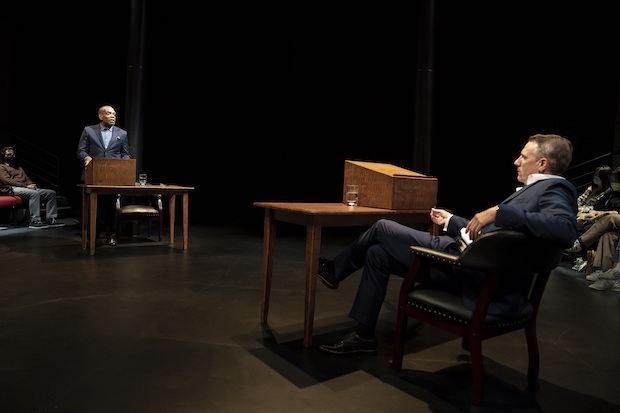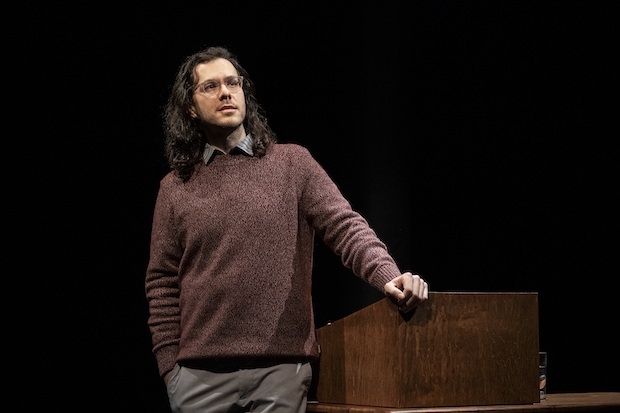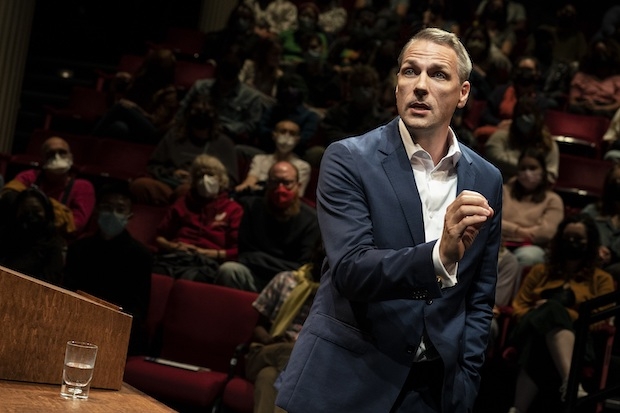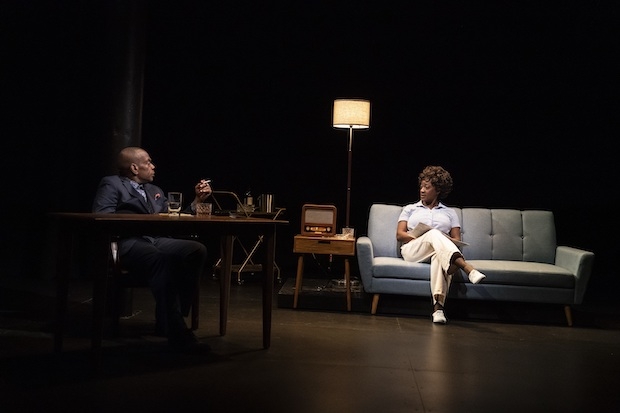Review: An Old Debate Resurfaces in Baldwin and Buckley at Cambridge
Elevator Repair Service recreates a 1965 Cambridge Union Debate at the Public Theater.

(© Joan Marcus)
Perhaps in response to the dearth of intelligent conservatives in public life, the theater is conjuring one in the form of the late National Review editor and television personality William F. Buckley Jr. In London, there's Best of Enemies, which dramatizes the skirmishes between Buckley and Gore Vidal (and seems destined to cross the pond). In New York, there's Elevator Repair Service's Baldwin and Buckley at Cambridge at the Public Theater, which recreates the 1965 Cambridge Union debate between Buckley and author James Baldwin on the question, "Has the American Dream been achieved at the expense of the American Negro?"
ERS is not the only company presently mining this Everest of rhetoric (watchable on YouTube) for dramatic ore. The American Vicarious mounted their version in March and are now embarking on a five-borough tour. Meanwhile, ERS has moved into the Public's Anspacher Theater (which suitably plays the role of the Cambridge debate hall) with a staging that is both more artistically daring and less dramatically satisfying.

(© Joan Marcus)
Under the direction of John Collins, the company's determination to make past bleed into present is established from the outset, when David Heycock (Gavin Price playing the undergraduate selected to debate in favor of the motion) acknowledges that the theater is situated on the original homeland of the Lenape people (he does not say when the Public intends to return this valuable piece of real estate). From there, he delivers a faithful version of Heycock's opening argument (albeit with more vitality) before ceding the floor to his opponent, Jeremy Burford (Christopher-Rashee Stevenson, slathering on the smarm and unnecessarily holding his argument at arm's length). This is all just primer for the main event.
That begins when James Baldwin (a dour Greig Sargeant, who conceived this project) takes the lectern to explain what it is like to live as a Black man under the hegemony of white supremacy, and to recount how the forced labor of Black people was instrumental in building the most prosperous nation on Earth. He also provides a stern prophecy concerning the American Dream: "The people who are denied participation in it, by their very presence, will wreck it. And if that happens it's a very grave moment for the West."
One of the frustrating things about this debate is that Buckley refuses to address Baldwin's actual argument, which is fundamentally liberal, at least within the hall (anarchists, as a rule, are not so concerned with the preservation of the West). Rather, he uses his time to joust with a straw man — the notion that Baldwin would like to drive a bulldozer over the whole American experiment, which he sees as irredeemably rooted in racism. It's almost as if he is experiencing premonitions of Ibram X. Kendi (Baldwin's unworthy successor) and choosing to debate with him instead.

(© Joan Marcus)
Ben Jalosa Williams (who also designed the sound) portrays a Buckley that is more handsome and charismatic than the actual man ever was. Speaking the arch-conservative's words in a baseline American dialect (rather than Buckley's outsize mid-Atlantic) he seems reasonable, passionate, and without the simmering resentment that so often underscored Buckley's discourse. He is utterly charming.
He momentarily drops the veneer when he is interrupted by a heckler who calls out the disenfranchisement of Black voters in Mississippi. Unable to resist, Buckley uses this opportunity to argue that the problem in Mississippi isn't that too few Black people vote, but that too many white ones do. Williams accompanies this pre-Enlightenment indulgence with a physical and vocal transformation, his arm akimbo against a haughtily erect back, his eyebrows arching like Faye Dunaway at the MAC counter. Suddenly, the nasal purr of William F. Buckley rings in our ears. But like the werewolf returning to his human form, this fades away as quickly as it came and we are left with a Buckley who is uncomfortably persuasive for the good liberal public at the Public.
But does it matter that the onstage Buckley is the better debater when we already know that he is on the wrong side of history? In this case, yes. Sargeant's performance is so relentlessly whiny and overwrought that it's hard to recognize much of Baldwin, even when the actor is speaking his words verbatim. Costume designer Jessica Jahn accentuates the demeanors of the two actors, putting Sargeant in a dark suit and shirt buttoned up to his neck (no tie). In contrast, Williams wears a well-tailored blue suit with open collar (wisely, Jahn has jettisoned the black-tie getup Buckley actually wore). Without the benefit of hindsight, one could be forgiven for assuming that Buckley emerges triumphant. Elevator Repair Service may be conducting an experiment pitting style against substance, in which case the former distressingly wins.

(© Joan Marcus)
A final scene that imagines an exchange between Baldwin and the playwright Lorraine Hansberry (Daphne Gaines, in a nice tie-in with the Public's current revival of A Raisin in the Sun) is underdeveloped and devolves into ERS acknowledging its own history of racism, specifically the casting of white actors to play Black roles in early iterations of The Sound and the Fury. This act of confession compounds with artistic director Oskar Eustis's program note ("I have been feeling a need for the Bible of James Baldwin") to reveal a theater that has become distinctly more religious in recent years — to its detriment.
Baldwin and Buckley at Cambridge at least avoids the trap of preaching to the choir, giving Buckley's argument its full hearing in its very best form. Still, one suspects that ERS is only doing it so we can learn to recognize the honeyed tongue of the devil.









